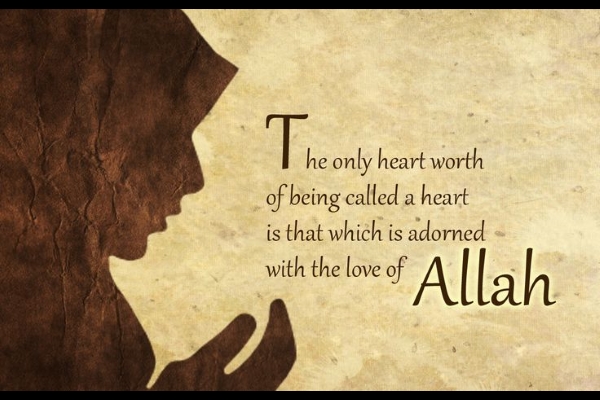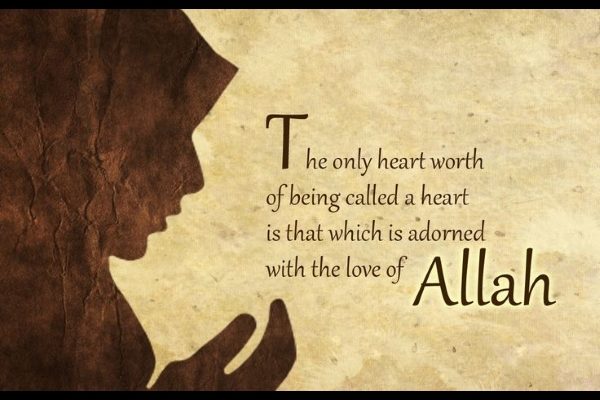

By: Uswatul Muslima
Source: Uswatul Muslima
From the Life of Umm Sulaim [Allah be pleased with her]
After Umm Sulaim (Allah be pleased with her) married Abu Talhah (Allah be pleased with him), they had a son named Abu ‘Umair (Allah be pleased with him). Abu ‘Umair (Allah be pleased with him) was a very handsome child and his father, Abu Talhah (Allah be pleased with him), loved him intensely.
One day, after Abu ‘Umair (Allah be pleased with him) had grown into a young, active child, he fell extremely sick. Abu Talhah (Allah be pleased with him) was so concerned and worried over his son that his health and condition began to deteriorate. Nevertheless, despite his son being extremely ill, Abu Talhah (Allah be pleased with him) would continue to visit and sit in the company of The Messenger of Allah (Allah’s peace be upon him) every morning and evening.
While Abu Talhah (Allah be pleased with him) was with The Messenger of Allah (Allah’s peace be upon him) one evening, Abu ‘Umair (Allah be pleased with him) succumbed to his illness and passed away. Umm Sulaim (Allah be pleased with her) thus sent her son, Anas (Allah be pleased with him), to call Abu Talhah (Allah be pleased with him). However, she instructed Anas (Allah be pleased with him) and the other members of her family saying, “Do not inform Abu Talhah (Allah be pleased with him) of the death of his son until I myself inform him.”
Then, before Abu Talhah (rdhiyallahu ‘anhu) could arrive, Umm Sulaim (Allah be pleased with her) took the body of her just-deceased son, gave it ghusl (ritual bath) and enshrouded it in a kafan. She then placed the body in a corner of the home, out of sight. She thereafter prepared supper for her husband, Abu Talhah (Allah be pleased with him), who happened to be fasting.
When Abu Talhah (Allah be pleased with him) arrived, he immediately asked Umm Sulaim (Allah be pleased with her), “How is the boy?” Umm Sulaim (Allah be pleased with her) replied, “He is more at peace than he ever was.” Abu Talhah (Allah be pleased with him) understood this reply to mean that the child had recovered from his illness and thus felt relaxed, allowing him to eat his supper in comfort. After he had eaten, Umm Sulaim (Allah be pleased with her), beautified herself more than she had ever done before and presented herself to her husband. They thereafter shared the bed.
The following morning, when Abu Talhah (Allah be pleased with him) had performed ghusl and was about to leave home, Umm Sulaim (Allah be pleased with her) said to him, “O Abu Talhah! Tell me, if some people loaned an item of theirs to a household and thereafter asked the household to return it, would the household have the right to withhold the item?” Abu Talhah (Allah be pleased with him) replied, “No.” Umm Sulaim (Allah be pleased with her) then said, “Hope for reward on account of your son (passing away). Allah Most High had loaned him to us and has now taken him back.” When he heard the news of his son’s demise, Abu Talhah (Allah be pleased with him) was naturally shocked and upset and said, “You left me to share the bed with you and thereafter informed me of my son?” He thereafter proceeded to perform Salah with The Messenger of Allah (Allah’s peace be upon him), after which he informed The Messenger of Allah (Allah’s peace be upon him) of the events of the previous night.
When he heard what had transpired, The Messenger of Allah (Allah’s peace be upon him) made du‘a for Umm Sulaim (Allah be pleased with her) and Abu Talhah (Allah be pleased with him) saying, “May Allah Most High grant you barakah in the night you spent together.” Thus, Umm Sulaim (Allah be pleased with her) had conceived that night.
Sometime thereafter, Umm Sulaim (radhiyallalhu ‘anha) was out of Madinah Munawarah, travelling with her husband accompanying The Messenger of Allah (Allah’s peace be upon him). As they neared Madinah Munawarah, Umm Sulaim (Allah be pleased with her) was struck by labour pains. On account of the labour, she could not make the final leg of the journey to enter Madinah Munawarah and thus Abu Talhah (Allah be pleased with him) had to remain with her to care for her.
Abu Talhah (Allah be pleased with him), due to his deep love for The Messenger of Allah (Allah’s peace be upon him), always desired to leave Madinah Munawarah with The Messenger of Allah (Allah’s peace be upon him) and enter the blessed city with The Messenger of Allah (Allah’s peace be upon him). Now, because he had to stay with Umm Sulaim (Allah be pleased with her), he would miss entering with The Messenger of Allah (Allah’s peace be upon him). He thus raised his hands in du‘a and supplicated saying, “O Lord! It pleases me to leave with Your Messenger (Allah’s peace be upon him) when he leaves, and enter with him when he enters. I am now held back, as You can see.”
When he made this du‘a, the labour pangs ceased and Umm Sulaim (Allah be pleased with her) exclaimed, “O Abu Talhah (Allah be pleased with him)! I no longer feel the pains that I was feeling! Proceed!” Thereafter, as they entered Madinah Munawarah, her labour resumed and she was blessed with a son. When the child was born, Umm Sulaim (Allah be pleased with her) said to Anas (Allah be pleased with him), “O Anas! Nobody will feed this child until you first take him to The Messenger of Allah (Allah’s peace be upon him).” Hence, as soon as it was morning, Anas (Allah be pleased with him) took his baby brother to The Messenger of Allah (Allah’s peace be upon him) who happened to have a branding-iron in his blessed hand at the time (with which he would brand the animals of zakat for identification purposes).
On seeing Anas (Allah be pleased with him), The Messenger of Allah (Allah’s peace be upon him) said, “Umm Sulaim has perhaps had a child?” The Messenger of Allah (Allah’s peace be upon him) then placed the branding-iron down and Anas (Allah be pleased with him) placed the baby in his blessed lap. The Messenger of Allah (Allah’s peace be upon him) then called for some ‘ajwah dates of Madinah Munawarah to be brought. When it was presented to him, he placed it in his blessed mouth and chewed it until it softened into a paste. He then placed it into the child’s mouth. When it was placed in his mouth, the baby began to suck at it eagerly. Noticing this, The Messenger of Allah (Allah’s peace be upon him) said, “Look at the love of the Ansar for dates!” The Messenger of Allah (Allah’s peace be upon him) then wiped the face of the baby and named him ‘Abdullah.
Sufyan bin ‘Uyainah (Allah’s mercy be upon him) narrates from a man of the Ansar (Allah be pleased with him) who mentioned that this son, ‘Abdullah, had nine sons, all of whom had studied the Quran Majeed.
(Reference: Saheeh Bukhari #1239, Saheeh Muslim #5612 and Fathul Bari vol. 3 pg. 217)
Lessons:
- The behavior and conduct of Umm Sulaim (Allah be pleased with her) on the demise of her son highlights her deep faith, love of Allah above all others, and her spirit of kindness and compassion. She would surely have been greatly grieved and affected by her son’s passing. Yet, despite her pain and grief, she put her emotions aside, in a remarkable display of true iman (faith), dutiful love of Allah, and compassion for her husband and family, and did all that she could to see to the comfort of her husband. As he was fasting, she did not break the news to him immediately, as it would have caused him to lose his appetite and go hungry. Furthermore, in case he needed to share the bed, she adorned herself and saw to his matrimonial needs as well. Finally, being the end of the day, he was tired. If she broke the news to him at that moment, his grief would have deprived him of sleep. Hence, she first saw to all the needs of her husband, and only when he had eaten, fulfilled his needs and rested did she break the news to him. The Messenger of Allah (Allah’s peace be upon him) was so pleased with her selfless behavior and conduct that he made du‘a for them. As a result, their son, ‘Abdullah (Allah be pleased with him), was born, and the barakah was evident in his progeny, where nine of his sons were ‘Ulama (deeply learned men of Religion).
- Today, most people remain connected to a network through which they can instantaneously communicate with people of their choice. The Sahabah (Allah be pleased with him) remained connected with Allah Most High and thus when they raised their hands to communicate with Him via du‘a, they often received an instantaneous response.



